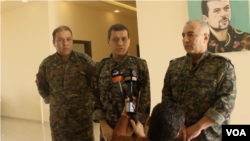Syrian Kurdish leaders are expressing optimism about continued U.S. support for their forces following former Vice President Joe Biden’s victory in last week's U.S. presidential election.
Kurdish-led Syrian Democratic Forces (SDF) have been a major U.S. partner in the fight against the Islamic State (IS) terror group. Backed by the U.S.-led international coalition against IS, SDF fighters have freed most of the territory once held by IS militants in Syria.
Mazloum Abdi, the commanding general of the SDF, congratulated President-elect Biden and Vice President-elect Kamala Harris on their election victory.
“We look forward to continued close cooperation with the United States to protect our gains in the fight against Daesh and build a better future for Syrians,” he said in a tweet Sunday, using an Arabic acronym for IS.
Following the partial U.S. troop withdrawal from northeast Syria in October 2019 and the subsequent Turkish invasion of the region, there were fears among the Kurdish community in Syria that the United States would permanently abandon them.
But Kurdish officials say they’re confident Washington would continue its support for them as the United States and Kurdish forces “have a common objective to defeat terrorism in Syria.”
“The U.S. support for us in the fight against Daesh has continued since 2014,” said Sinam Mohamad, SDF’s political representative in the United States.
“Our partnership started under [former President Barack] Obama, continued under [President Donald] Trump and will continue under Biden,” she told VOA. “What we would like to see from the new U.S. administration is translating this military support into political support for us.”
Mohamad said that Kurds are not represented in Syrian peace talks in Geneva and “that’s why we hope the Biden administration will bring more political support for us to be included in talks that will determine our future and that of Syria as a whole.”
Experts say Syrian Kurds are optimistic about the new U.S. administration since then-candidate Biden expressed support for Kurdish forces in Syria while on the campaign trail.
“The main important mission for the SDF now is to get some guarantees from the Biden administration to keep U.S. forces in northeast Syria,” said Shoresh Darwish, a Kurdish affairs analyst.
“What the Kurds really want from the new U.S. administration is a sort of protection from future Turkish attacks on the region,” he told VOA.
2019 drawdown
During a campaign speech in the U.S. state of Iowa in October 2019, Biden described President Trump’s decision to withdraw U.S. forces from Syria as a “complete failure,” saying that such a withdrawal would leave Syrian Kurds open to attacks from Turkey, which views Syrian Kurdish fighters as terrorists.
“It’s more insidious than the betrayal of our brave Kurdish partners; it’s more dangerous than taking the boot off the neck of ISIS,” Biden said at the time, using another acronym for Islamic State.
Then-Defense Secretary Mark Esper defended Trump's proposed withdrawal of what he called “less than 1,000 troops” to prioritize the safety of American soldiers, arguing that the United States wouldn’t be able to deter Turkey from invading Syria.
“Fifty service members are not going to stop a Turkish advance,” Esper told "Fox News Sunday" in an October 2019 interview, referring to a small “trip wire” military unit positioned along the Turkish border that Trump had recently withdrawn. “The U.S. doesn’t have the forces on hand to stop an invasion of Turkey that is 15,000 strong.”
After mounting pressure from Congress and U.S. foreign allies, President Trump decided to keep some 700 troops in northeast Syria. U.S. officials say their mission is to continue the war against the remnants of IS and prevent the Syrian regime from accessing oil fields in eastern Syria.
Post-IS stabilization
Nicholas Heras, a Syria expert at the Institute for the Study of War in Washington, says the most important change that a Biden administration could make in its Syria policy would be to increase funding for civilian-led stabilization projects in northeast Syria.
“Biden’s closest foreign policy advisers have already stated that a Biden administration would continue to work to prevent the resurgence of ISIS in Syria, and work with the SDF to achieve that goal,” he told VOA.
“The real need in SDF-controlled areas is increased U.S. assistance to post-ISIS areas to rehabilitate local communities, which is best done by civilian agencies,” Heras noted.
“If a Biden administration took that approach to increase funding for these types of stabilization projects, and increased the number of U.S. civilian experts to support these projects, that would be a big boost to the SDF,” he added.
Supporting intra-Kurdish dialogue
In June 2020, the United States announced its backing for unity talks between rival Kurdish groups to govern Syria’s northeast. Kurdish officials believe that Biden’s administration should continue supporting such talks.
“These are important talks for us and they won’t succeed without full-fledged American support,” said Kamiran Hajo, a senior official with the Kurdish National Council in Syria, a political alliance involved in the U.S.-supported Kurdish dialogue in Syria.
“What we really expect from President-elect Biden and his administration is to make sure that these Kurdish talks come up with tangible results in the near future,” Hajo told VOA.





